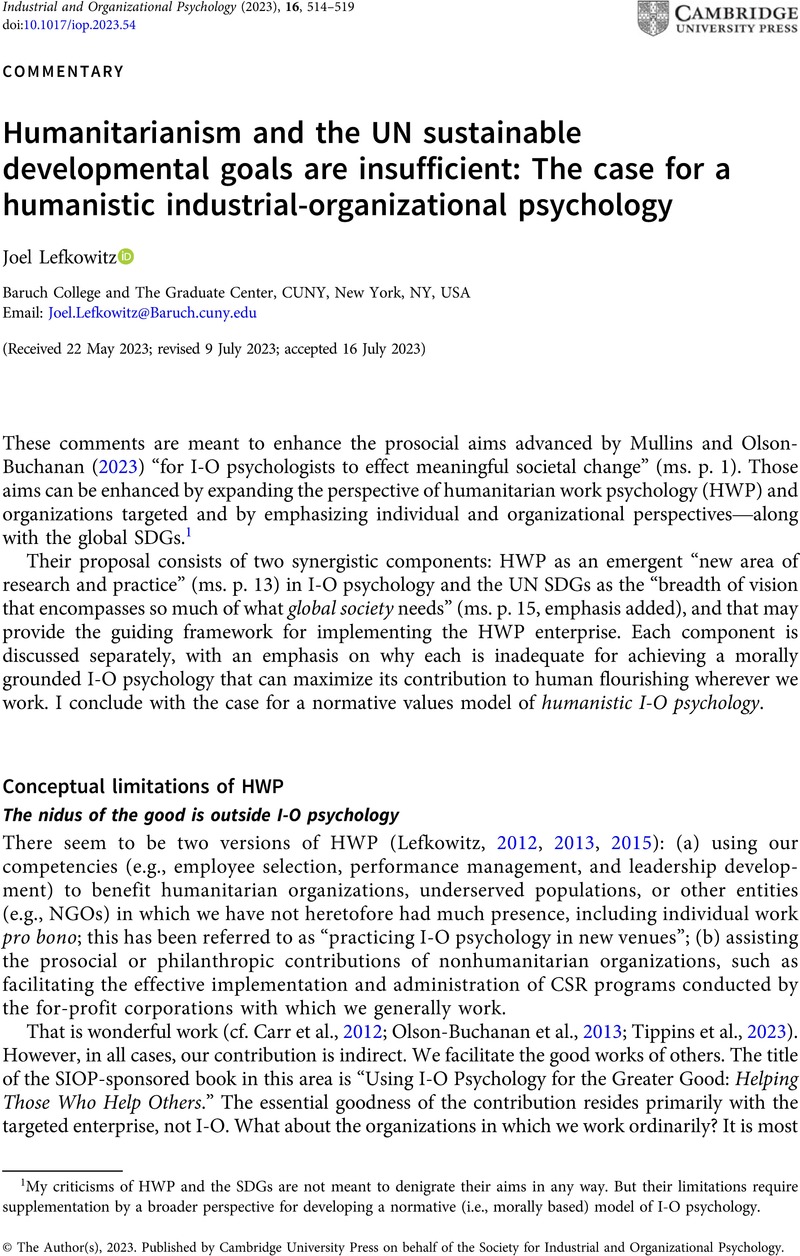No CrossRef data available.
Article contents
Humanitarianism and the UN sustainable developmental goals are insufficient: The case for a humanistic industrial-organizational psychology
Published online by Cambridge University Press: 22 November 2023
Abstract
An abstract is not available for this content so a preview has been provided. Please use the Get access link above for information on how to access this content.

- Type
- Commentaries
- Information
- Copyright
- © The Author(s), 2023. Published by Cambridge University Press on behalf of the Society for Industrial and Organizational Psychology
References
Baritz, L. (1960). The servants of power: A history of social science in American industry. Greenwood.CrossRefGoogle Scholar
Carr, S. C., MacLachlan, M., & Furnham, A. (Eds.) (2012). Humanitarian work psychology. Palgrave Macmillan.CrossRefGoogle Scholar
Eaton, A. A., Grzanka, P. R., Schlehofer, M. M., & Silka, L. (Eds.) (2021). Special issue: Public psychology: Engaged science for the 21st century. American Psychologist, 76(8), 1209–1216.CrossRefGoogle Scholar
Edwords, F. (2008). What is humanism? https://americanhumanist.org/what-is-humanism/edwords-what-is-humanism/
Google Scholar
Hüffmeier, J., & Zacher, H. (2021). The basic income: Initiating the needed discussion in industrial, work, and organizational psychology. Industrial and Organizational Psychology: Perspectives on Science and Practice, 14(4), 531–619.CrossRefGoogle Scholar
Kimble, G. A. (1984). Psychology’s two cultures. American Psychologist, 39(8), 83–839.CrossRefGoogle Scholar
Kornhauser, A. (1947). Industrial psychology as management technique and as social science. American Psychologist, 2(7), 224–229.CrossRefGoogle ScholarPubMed
Lefkowitz, J. (1990). The scientist-practitioner model is not enough. The Industrial-Organizational Psychologist, 28(1), 47–52.Google Scholar
Lefkowitz, J. (2005). The values of industrial-organizational psychology: Who are we? The Industrial-Organizational Psychologist, 43(2), 13–20.Google Scholar
Lefkowitz, J. (2006). The constancy of ethics amidst the changing world of work. Human Resource Management Review, 16, 245–268.CrossRefGoogle Scholar
Lefkowitz, J. (2008). To prosper, organizational psychology should…expand its values to match the quality of its ethics. Journal of Organizational Behavior, 29, 439–453.CrossRefGoogle Scholar
Lefkowitz, J. (2011). The science, practice and morality of work psychology. Industrial and Organizational Psychology: Perspectives on Science and Practice, 4(1), 112–115.CrossRefGoogle Scholar
Lefkowitz, J. (2013). Values and ethics of a changing I-O psychology: A call to (further) action, Chap. 1. In Olson-Buchanan, J. B., Koppes Bryan, L. L., & Thompson, L. F. (Eds.), Using I-O psychology for the greater good: Helping those who help others (pp. 13–42). Society for Industrial and Organizational Psychology, Frontier Series.Google Scholar
Lefkowitz, J. (2019). The conundrum of industrial-organizational psychology. Industrial and Organizational Psychology: Perspectives on Science and Practice, 12(4), 473–478.CrossRefGoogle Scholar
Lefkowitz, J. (2023). Values and ethics of industrial-organizational psychology (3rd ed., 663 pp). Taylor & Francis/Routledge. First published as Ethics and values in industrial-organizational psychology (2003). Lawrence Erlbaum Associates.CrossRefGoogle Scholar
Lefkowitz, J. (2012). The morality of business: From humanitarian to humanistic work psychology, Chap. 5. In Carr, S. C., MacLachlan, M., & Furnham, A. (Eds.), Humanitarian work psychology: Alignment, harmonization and cultural competence (pp. 103–125). MacMillan.CrossRefGoogle Scholar
Lefkowitz, J. (2015). The maturation of a profession: A work psychology for the new millennium. In McWha, I., Maynard, D. C., & ONeill Berry, M. (Eds.), Humanitarian work psychology and the global development agenda: Case studies and interventions. Routledge Psychology Press.Google Scholar
Maslow, A. H. (1962). Toward a psychology of being. Princeton, NJ: D. Van Nostrand.CrossRefGoogle Scholar
Mullins, M., & Olson-Buchanan, J. (2023). Moving boundaries in what I-O psychology has been, and what I-O psychology can be: The United Nations sustainable development goals as an organizing framework. Industrial and Organizational Psychology, 16(4), 479–494.CrossRefGoogle Scholar
Mumby, D. K. (2019). Work: What is it good for? (Absolutely nothing)—a critical theorist’s perspective. Industrial and Organizational Psychology: Perspectives on Science and Practice, 12(4), 429–443.CrossRefGoogle Scholar
Olson-Buchanan, J., Bryan, L. K., & Thompson, L. F. (2013). Using industrial-organizational psychology for the greater good: Helping those who help others. Routledge.CrossRefGoogle Scholar
Pirson, M. (2017). Humanistic management: Protecting dignity and promoting well-being. Cambridge University Press.CrossRefGoogle Scholar
Roback, A. A. (1917). The moral issues involved in applied psychology. Journal of Applied Psychology, 1(3), 232–243.CrossRefGoogle Scholar
Tippins, N., Hakel, M., Grabow, K., Kolmstetter, E., Moses, J., Oliver, D., & Scontrino, P. (2023). I-O psychology and volunteer work. Industrial and Organizational Psychology: Perspectives on Science and Practice, 16(4), 479–494.CrossRefGoogle Scholar
Weiss, H. M., & Rupp, D. E. (2011). Experiencing work: An essay on a person-centric work psychology. Industrial and Organizational Psychology: Perspectives on Science and Practice, 4(1), 83–97.CrossRefGoogle Scholar


